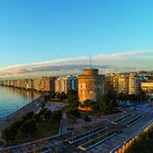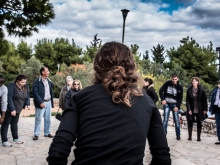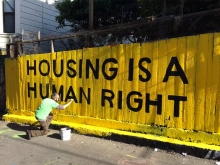
Thessaloniki
Thessaloniki is a modern metropolis bearing the marks of its stormy history and its cosmopolitan character, which give it a special beauty and charm. Historically, Thessaloniki has strong cultural and economic ties with its neighboring countries in Southeastern Europe and the Mediterranean. Inhabited continuously since 315 BC, it has been part of the Hellenic, Roman, Byzantine and Ottoman empires. It also has a strong Jewish history, which gives the modern city a multicultural character. Every year more than 2 million visitors reach Thessaloniki, with more than 1.5 million from international locations. Culture and history, highlighted by 31 museums and 15 UNESCO monuments, are highly valued by the citizens, and creative, cultural, and tourist projects and initiatives proliferate.
Today, Thessaloniki is a lively, multicultural city that attracts young people and international companies. Thessaloniki has the largest youth population of any other Greek city, thanks to its wealth of learning and academic institutions. Youth human capital is already a key topic on the city’s agenda, evidenced by the awarding of the title European Youth Capital in 2014.
Thessaloniki was also selected in 2014 as part of the second cohort of cities to join the 100 Resilient Cities network. The City of Thessaloniki and the Major Development Agency of Thessaloniki joined forces with to create the 2030 Resilience Strategy that delivers both local and metropolitan scale urban solutions.
The city’s main challenge for today is to thrive as a sustainable metropolis, design and deliver urban infrastructures that serve people with efficiency, environmental integrity, and strategic use of resource, activate and support local talent, regenerate the urban economy, and attract investments that promote sustainable growth.
SOME RELATED NETWORKS
RESILIENT EUROPE
My Generation at Work
News
News from our networks – 9 April 2021
Article
Engaging cities to reject housing exclusion as a ‘fact of life’
Article
23 Action Planning Networks ready for Phase 2!
Article
Cities engaging in the right to housing
Article






